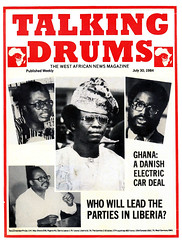Taking Care of the Aged
by A Correspondent
Ghanaians recognise the old person as a link between the living and the dead. He pours libation to the gods or ancestors during festivals to invoke the 'spirit' of the dead to offer protection and assistance.
Since 1945, Ghanaian traditional societies have undergone social and economic changes. These changes have naturally affected traditional political structures. Formal education and urbanisation, have been the major inst- ruments of these changes and have brought in their trail new ideas, new concepts of the family, new patterns of social forms and relationships.
Now the role of the old person in traditional Ghanaian society has been taken over by alternative social institutions in the modern, urbanised communities. The authority of the aged in the traditional context has been replaced by that of the Prime Minister or President in the modern context. Rules regarding good conduct are now the prerogative of the legislature. Traditional methods of impeachment or chastisement are now in the hands of the police, the judiciary and other security agents.
These changes have not brought healthy consequences. In recent times, there have been confrontations between traditional patterns of social behaviour as they affect the aged and those of modern forms. The urban dweller in Ghana, because of his education, job security and guaranteed income, feels 'independent' and consequently he flouts established traditional authority.
According to Dr Patrick Twumasi of the Department of Sociology, University of Zambia, the new educational experiences acquired by the youth, far from strengthening the traditional culture, have helped to 'alienate' the youth from the aged. And from the psychological dimension the old are 'left out' in the new socialization process.
Annual reports of hospital welfare services in Ghana show that since 1966 there is an increasing concern over the number of old people who have difficulty when discharged. The reason is that they have nobody in their homes to take good care of them. Most of the old people in Ghana have been farmers who have no social security scheme or pension rewards to take care of them in their dying days.
Available figures indicate that about 60-80 percent of the working population in Africa are engaged in subsistence farming in the rural and outlying settlements.
It cannot be said that increases in the proportion of the old compared to active adults are viewed with alarm by the Ghana Government. This is because Ghanaians' conception of extended family system and its related customary obligations do not make old people destitutes for who the state must rehabilitate as the case is in developing countries like Brazil, India, Mexico and Indonesia.
Majority of old people stay with their external family relations in the villages. They are fed and clothed by contributions periodically received from those family members who reside in the cities.
It is the considered view of many social scientists that since health has improved and people live longer, Ghana's official retirement age should be raised from 55 to 65 years.
